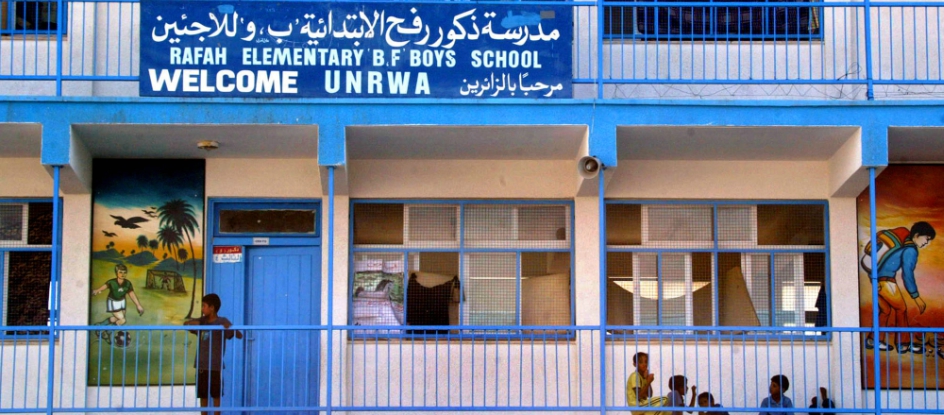320,000 Arab students studying in UNRWA educational institutions are exposed from an early age to hatred of Jews and encouragement of terrorism

The United Nations Relief and Works Agency (UNRWA) for Palestinian refugees and their descendants is responsible for the education of about a quarter of Palestinian schoolchildren in the West Bank and Gaza Strip. UNRWA maintains and operates ninety-six schools throughout Judea and Samaria, in addition to 276 educational institutions in the Gaza Strip.
Arab terrorist organizations have used the institutions themselves as bases for terrorist activity and the digging of tunnels into Israel. In addition to that, an examination of the contents taught in schools reveals a comprehensive system of incitement and education for hatred from a very young age, all under the official auspices and assistance of the United Nations.
The vast majority of textbooks used in UN schools are produced and distributed by the Palestinian Authority. In schools in Gaza, students in addition to PA books, use books published by the Hamas government.
In general, the textbooks of the Palestinian Authority are characterized by three basic principles regarding the Jewish-Israeli dimension: de-legitimization of the State of Israel and the very presence of the Jews in Israel, the demonization of Israel and the Jews, and the call for a violent struggle for the liberation of Palestine, including pre-1967 borders, and against coexistence with Israel.
As part of this call for violent struggle, schoolchildren are encouraged to take part in hostilities by presenting the struggle against Israel as an inevitable need, including the violent return of the descendants of the refugees to pre-1967 Palestine.
Another way to glorify the violent struggle is to glorify Jihad and death while fighting for Islam (Shahada). Those Palestinians who participate in this struggle are called heroes and role models, and there are even cases in which the students are openly encouraged to be like them and take part in wartime activities.
In the project of printing textbooks started by the Palestinian Authority in 2016, seventy new books have been published, which join dozens of old books that are still being used and written in the same spirit. A crucial element in imparting the ideas of the Palestinian Authority’s struggle in this context is the PA official hymns and the main body within it – the Fatah organization – which are taught by students in the lower grades.
For example, the children sing in the anthem of the Palestinian Authority: “With my resolve, my fire and the volcano of my vengeance and the longing of my blood to my land and my house, I climbed the mountains and conducted the struggle … in the storm of wind and the fire of weapons and my determination to wage the struggle, Palestine is my home and the path to my victory, Palestine is my revenge. “
The anthem ends with the battle cry: “I will live as a fedai, I will continue as a fedai, and I will die as a fedai until I return (to my land).” Fedai is Arabic (الفدائيّ) for “Those willing to sacrifice their lives”. These words appear in a book called ‘National Education and Life’ taught to third graders.
The anthem of Fatah is already taught in the book “Our Beautiful Language,” which is intended for second graders and includes, among other things, the promise to return to all areas of the Land of Israel, even beyond the 1967 borders: “We gave our souls to the revolution … to Haifa, Aqsa Mosque, to the Dome of the Rock. ”
Other passages in the books depict terrorists killed as exemplary figures. For example, Dalal Mughrabi, who commanded the 1978 bombing of the coastal road in which 35 Israelis were murdered, is recalled in the book ‘Arabic Language’, which is taught in the fifth grade, among the martyrs of the Muslim and Arab history of the country. In another book entitled “Social Studies” for the ninth grade, states that:“Dalal Mughrabi, who commanded the Deir Yassin military operation on the Palestinian coast in 1978, in which more than 30 soldiers were killed.” Many schools and institutions are named after Mugrabi.
The violent struggle, in which Palestinian children are encouraged to participate, includes the so-called “right of return.” In a poem that is taught in a third grade book and entitled “The Cry of the Refugee” it says: “I will not live as one who was uprooted; I will not be bound, I have tomorrow and tomorrow I will march as an avenger and rebel … I have a great right from which I will make tomorrow. I shall restore it as an expensive and sovereign homeland. “
In another song that is taught in third grade, to the study of the violent struggle and incitement they added the requirement to destroy the “foreigners”: “I swore! I will sacrifice my blood to quench the land of the nobles, remove the robber [a common name for Israel] from my land, and destroy the remnants of the foreigners, for victory is ours, and dawn emerges from the darkness. “
This incitement was accompanied in another book (ninth grade) by a horrific description of the victims of the violent struggle and their comparison to the meat cooked in the oven. For example, the song describes an attack of Molotov cocktails on an Israeli civilian bus in the Binyamin area: “There seems to be a roast party by Molotov cocktails on one of the buses of the Psagot settlement.”
These are just a few examples of the materials to which 320,000 Palestinian children are exposed every day in UNRWA schools, most of whose budget comes through the UN from European countries and the United States.
*(Translated from Mida.org.il Hebrew)
____________________
Dr. Arnon Gross is Director of the Research Department at the Center for Middle East Policy Research
[Find this article interesting? You can find more in depth articles on Israel and the Middle East @en.mida.org.il]



